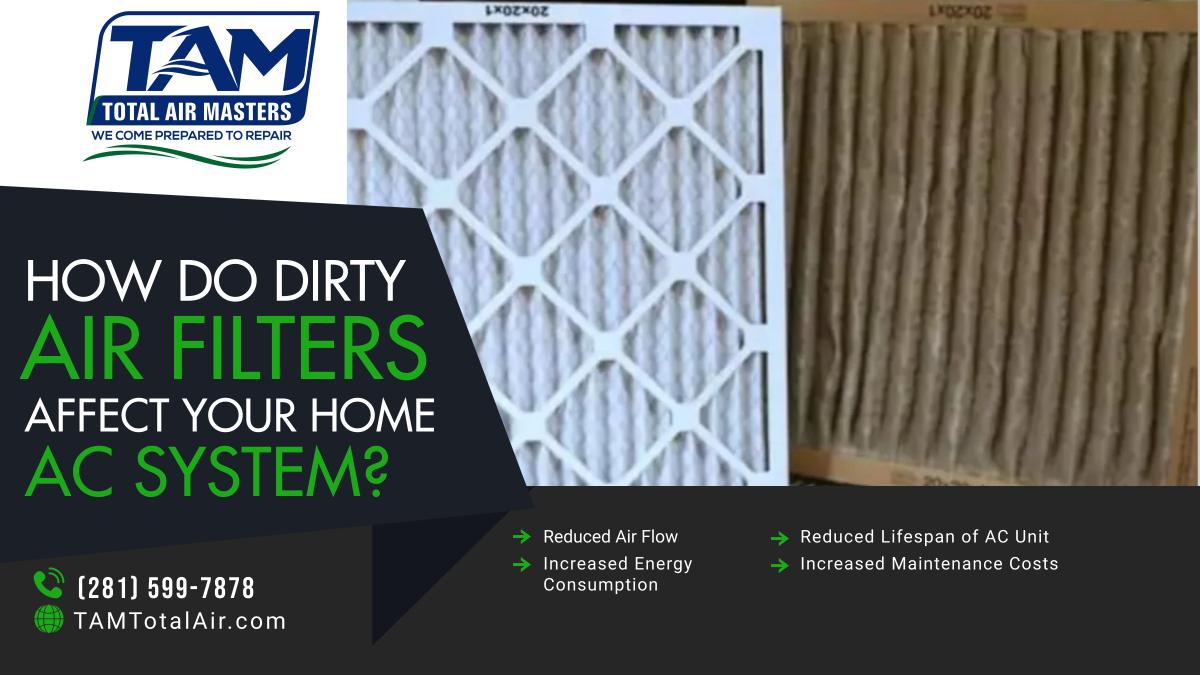
Air filters play an essential role in the functioning of your home’s air conditioning system. They are designed to trap dirt, dust, and other airborne particles, preventing them from circulating in your home’s air. Over time, these filters become clogged with debris, which can have several negative effects on your air conditioning system’s efficiency, lifespan, and overall performance.
Lets discuss how dirty air filters can affect your home AC system and why it is essential to replace them regularly.
Reduced Airflow
When air filters become dirty, they will restrict the flow of air through the air conditioning system. This means that your AC unit has to work harder to push air through the clogged filter, which can reduce its overall efficiency. Reduced airflow leads to poor indoor air quality and uncomfortable living conditions, as the air is not circulating effectively throughout your home.
Increased Energy Consumption
When your AC unit has to work harder to push air through a dirty air filter, it uses more energy to do so. This can lead to increased energy consumption and higher electricity bills. According to Amana, a dirty air filter can increase your air conditioning system’s energy consumption by up to 15%.
Reduced Lifespan of the AC Unit
When an air conditioning unit is forced to work harder to push air through a dirty air filter, it can put additional stress on the system. This can lead to premature wear and tear on the AC unit, reducing its overall lifespan. Over time, this can lead to costly repairs and the need for premature replacement of the entire system.
Increased Maintenance Costs
When an air conditioning system is not working efficiently due to a dirty air filter, it can lead to increased maintenance costs. For example, a clogged filter can cause the evaporator coil to freeze, which can lead to costly repairs. It can also cause the system’s blower motor to work harder, leading to increased wear and tear on the motor and the need for more frequent repairs.
Poor Indoor Air Quality
One of the primary functions of an air filter is to trap airborne particles, preventing them from circulating in your home’s air. When an air filter becomes clogged, it can no longer effectively trap these particles, leading to poor indoor air quality. This can be particularly problematic for individuals who suffer from allergies or respiratory issues.
Increased Risk of System Failure
When an air conditioning system is not functioning efficiently, it is at increased risk of failure. This can lead to costly repairs and the need for premature replacement of the entire system. By replacing your air filter regularly, you can help ensure that your AC unit is functioning at peak performance, reducing the risk of system failure.
Dirty air filters can have several negative effects on your home AC system, including reduced airflow, increased energy consumption, reduced lifespan of the AC unit, increased maintenance costs, poor indoor air quality, and an increased risk of system failure. To avoid these issues, it is essential to replace your air filter regularly. How often you should replace your air filter depends on several factors, including the type of filter, the size of your home, and the number of occupants in your home. As a general rule, it is recommended that you replace your air filter every 1-3 months. By doing so, you can help ensure that your AC unit is functioning efficiently, prolong its lifespan, and improve the indoor air quality of your home.
Schedule an AC Tune Up with us today to ensure your system is performing optimally.
